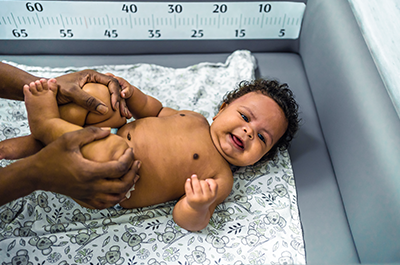Unlike the past two school years, this is the first year that all children ages 6 months and up are eligible to get the COVID-19 vaccine. However, people have been feeling different about doing so.
“Some families have been really excited, others are still feeling hesitant,” says Michelle Day, M.D., a pediatrician at Henry Ford Health. “I encourage families to have a discussion with their pediatrician to have their questions addressed. Going back to school, kids will be in enclosed spaces, having circle time, working on projects together—and it takes just one child to spread an illness.”
Here, Dr. Day and Dennis Cunningham, M.D., medical director of infection control and prevention at Henry Ford Health, share ways to keep your children safe as they head back to school this year.
1. Get your children vaccinated + boosted.
Vaccination is the best way to prevent the spread of COVID-19. And while many people assume children aren’t affected by COVID-19, that’s not true. Kids can get long-haul symptoms of COVID-19—even if they don’t have a serious illness—and they can also contract severe disease.
Luckily, not only are children ages 6 months and up eligible for COVID-19 vaccination, but children ages 5 and up are eligible for a Pfizer booster five months after receiving their primary COVID-19 Pfizer series. Dr. Cunningham recommends staying on top of your child’s vaccination schedule and getting them a booster when they’re eligible.
“The vaccines we have work against the COVID-19 Omicron variants BA.4 and BA.5,” he says. “They offer great levels of protection for three months, then they really drop off around six months. But even as they’re dropping, they’re still protective against severe disease and hospitalization. There is a new booster coming out that will specifically target the Omicron variant, which could be available for adults in September, but it likely won’t be ready for kids until early next year. So I encourage parents to get their kids boosted with the vaccine we have now.”
Two weeks after your last COVID-19 dose is when you’re considered fully protected, so take that into account as you are planning your child’s vaccination schedule.
2. Encourage good hand hygiene.
“If you have young kids, talk to them about the importance of washing their hands, and practice with them,” says Dr. Day. “That’s really important, especially as polio has been found in New York and spreads by fecal-oral contact.” Stress the importance of not sharing water bottles with their friends and encourage your little ones to keep their hands out of their mouths.
3. Don’t give up on masking.
When everyone was wearing masks at the height of the COVID-19 pandemic, the spread of viral illnesses like RSV and the flu greatly dropped. “That shows us that masking is definitely helpful,” says Dr. Day. “As masking mandates have dropped throughout the community, we’re seeing those illnesses rise again. Since masking isn’t widely practiced in a community setting as of late, everything else will be really important—getting vaccinated, practicing good hand hygiene.”
If your child is wearing a mask to school, give them guidance ahead of time on how to deal with questions or peer pressure. You can tell them they wear a mask to protect themselves and others who may be more vulnerable to COVID-19. While it can be difficult—especially at a young age—give them the tools to advocate for themselves.
4. Keep your kids home if they’re sick.
“We need to get out of the mentality that we have to go to work or school even if we’re sick,” says Dr. Cunningham. If you have symptoms, get tested and stay home until you are no longer contagious.
5. Continue to use reliable sources to follow the latest pandemic news.
Keeping up with the latest dips and rises in COVID-19 cases can help guide your decision-making process on what activities are safe to do at any given moment. The Centers for Disease Control and Prevention (CDC), the World Health Organization (WHO) and healthcare systems are reliable sources for providing the facts on the pandemic.
COVID-19 vaccinations are available for established patients. Parents can schedule COVID-19 vaccine appointments for their children ages 6 months and up via MyChart or by calling their Henry Ford Health physician’s office.
To find a pediatrician at Henry Ford Health, visit henryford.com or call 1-800-436-7936.
Dr. Dennis Cunningham is the medical director of infection control and prevention at Henry Ford Health.
Dr. Michelle Day is a primary care pediatrician at Henry Ford Health. She sees patients at Henry Ford Medical Center—Farmington Road.



